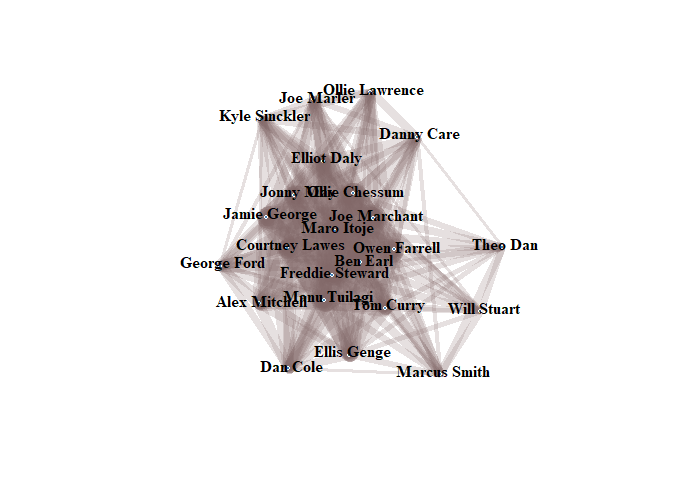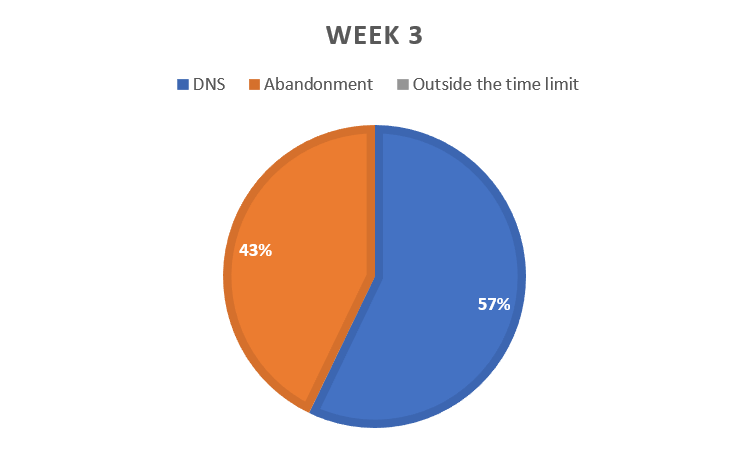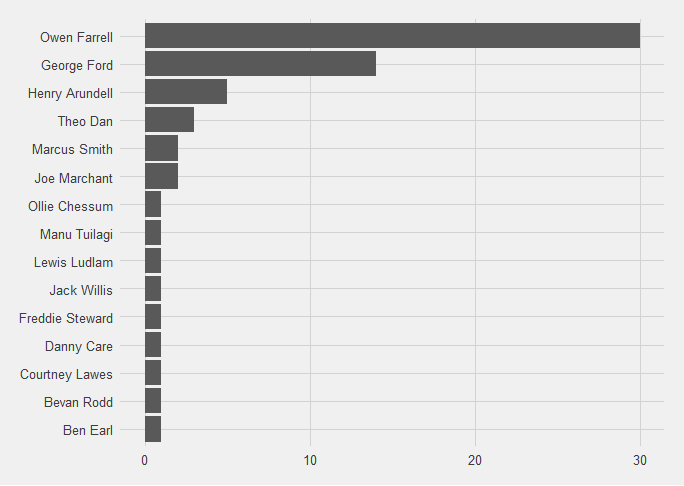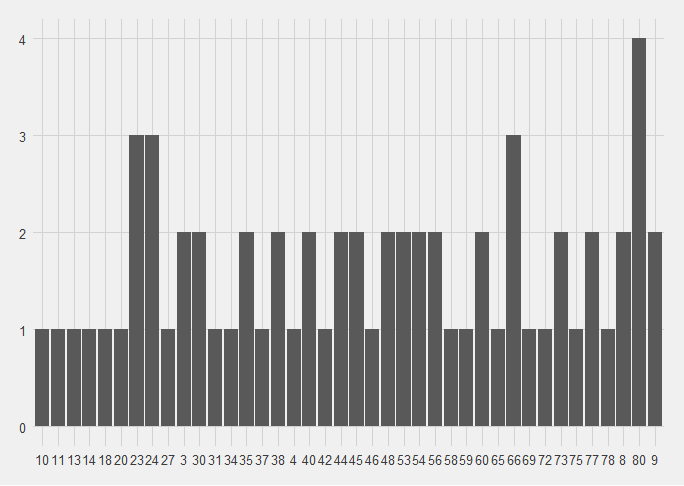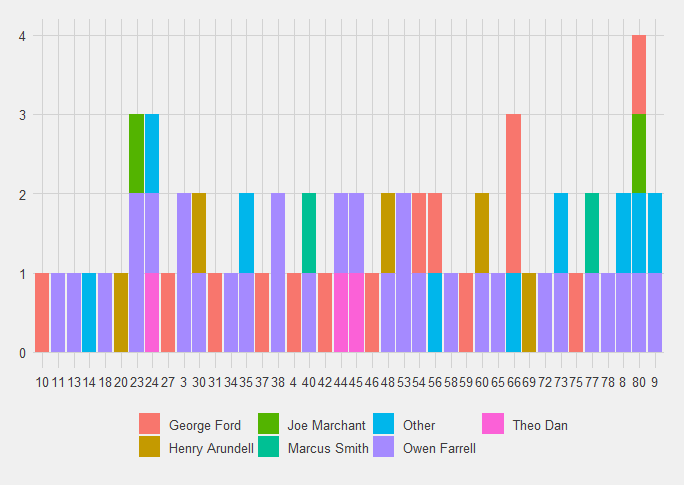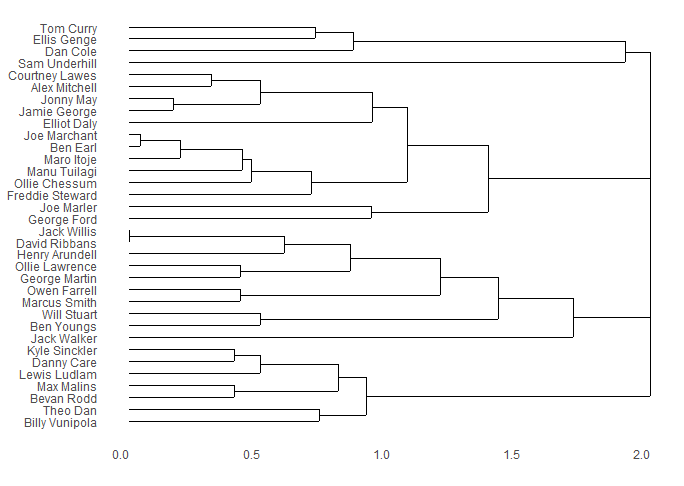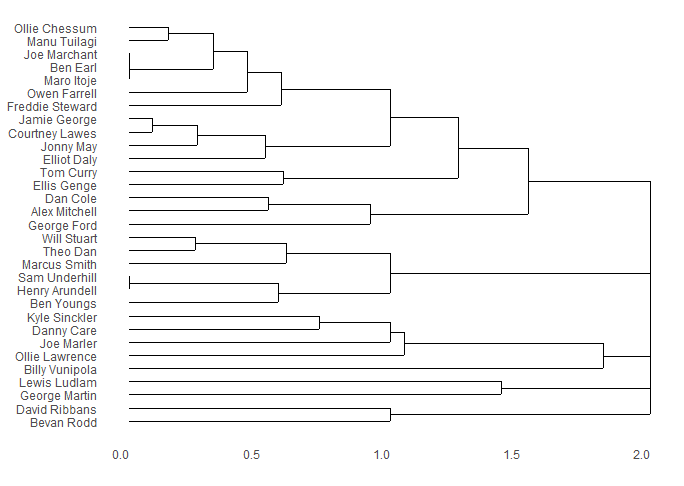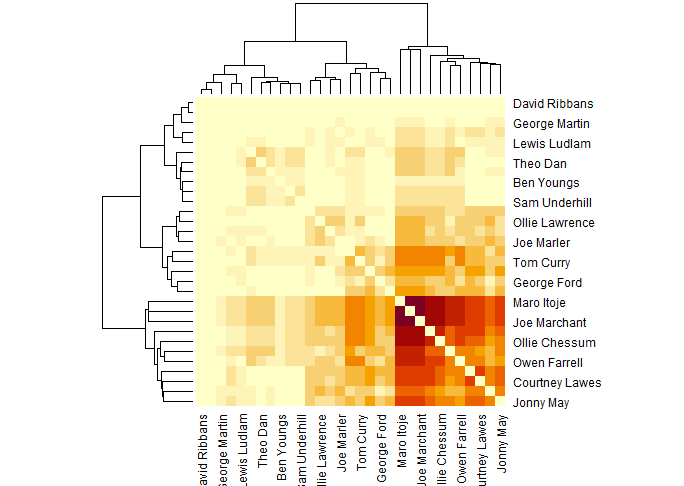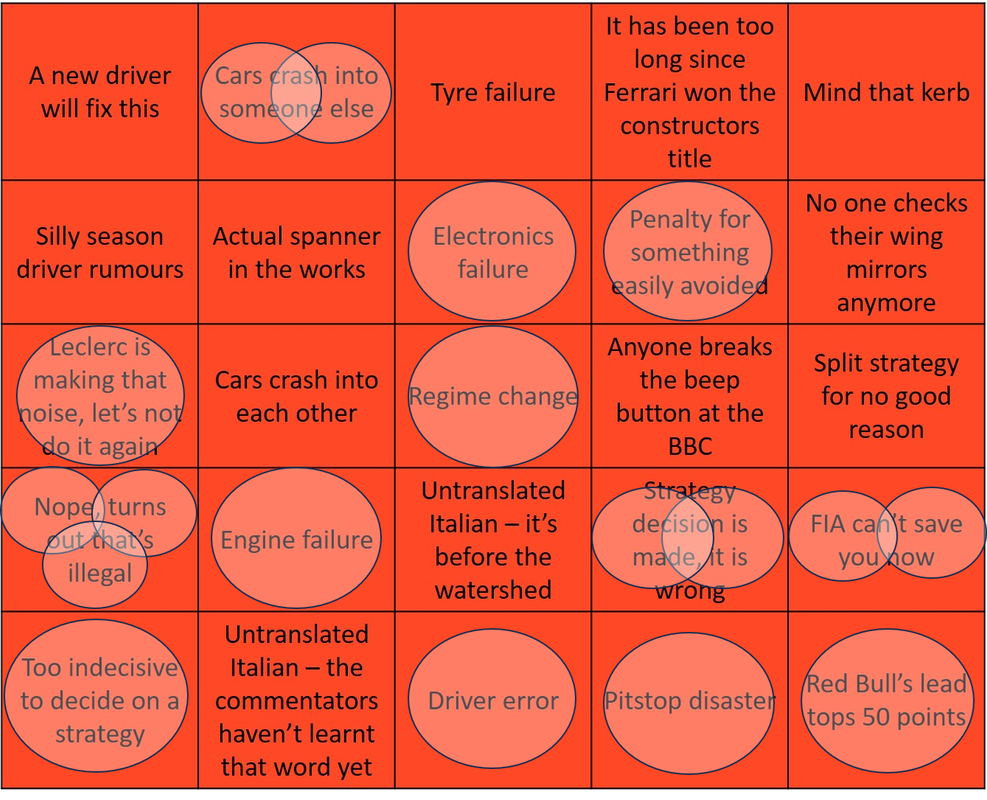 Red Bull's lead was >50 points by the second race, just so everyone can understand my pain.
Red Bull's lead was >50 points by the second race, just so everyone can understand my pain. Thursday 30 November 2023
Formula 1 2023 - A Round Up of the Last 5 Grand Prix of the Season
 Red Bull's lead was >50 points by the second race, just so everyone can understand my pain.
Red Bull's lead was >50 points by the second race, just so everyone can understand my pain. Wednesday 22 November 2023
A Bushel of the Bard - the Tragedies
I told you I was trying to finish things off.
Antony and Cleopatra: I have only ever seen one version all the way through, the Ralph Fiennes / Sophie Okonedo National Theatre one they shared during COVID.
The Charlton Heston one is not as bad as you have been told, but I might be biased by John Castle as Octavian, Roger Delgardo as the Soothsayer and Eric Porter giving it torn between duty and love as Enobarbus, and very few people do that better than Eric Porter. (Martin Landau as not Enobarbus is the Elizabeth Taylor Cleopatra is also my favourite thing in that.)
I have many Enobarbus thoughts, as my review of the NT version will show, I think because his dilemma is just more interesting that the central pair's (I also suffer from "I don't see what's so wrong with Octavian").
King Lear: L remediated my lack by taking me to see the Kenneth Branagh version in November. L is awesome.
The reason for the lack is that my mother objects to gore, which is also why there is nothing for Titus Andronicus here.
Macbeth: I have strong Macbeth opinions.
The best recorded version I ever saw is the Sean Pertwee modern dress one. There is no reason for a Channel 4 reasonably-low-budget-undoubtedly-designed-for-GCSE-students version to be so good, but it is.
The first version I ever saw was the Animated Shakespeare one which is beautifully done. It's still the first one I think of when I hear any of the words.
I've seen it live once, at the local theatre, a tiny production with maybe seven people who were the stage crew, the sound crew and the actors. And yet, by the end, I was there on the blasted heath as Macbeth had his throat slit. It's still 20 odd years later one of the best things I've ever seen on a stage.
The worst version is undoubtedly the Jason Connery version - they cut "one fell swoop". Why would you do that?
I'm also in the minority that aren't huge fans of the McKellen / Dench version (although that is the best take on "Tomorrow, and tomorrow and tomorrow"), or the Patrick Stewart version (I am done with heavy-handed Soviet iconography) or the recent-ish Eccleston version.
One day I will get round to watching the Nicol Williamson version.
Hamlet: I do not have a Hamlet problem. Please ignore that I have two copies of Hamlet in the room. (In my defence, I also have a Coriolanus and the Hollow Crown. And three different versions of the Three Musketeers.)
Favourite, I'm going to go with the obvious and Kenneth Branagh, because I do love it so. I am also very fond of the Nicol Williamson version. He is ten to twenty years too old but he is also the most convincing scholar-prince.
Worst is a tie between the Ethan Hawke version (which does have the redeeming features of Julia Stiles and Liev Schreiber) and the terrible Andrew Scott version which I nearly threw shoes at my TV over. I'm also not that fond of the most recent NT version.
I'm not that wow-ed by the Tennant version or the Zeffirelli version, both of which fail the "am I cheering for Laertes?" test. Michael Moloney and Nicholas Farrell are tied for "most Hamlet characters I've seen an actor play", because Nicholas Farrell was the voice of Hamlet in the Animated version, which is beautiful. Mother has called the Zeffirelli version "why won't you die already?" which isn't a good sign either. I had issues with the Globe's gender-swapped version, although I really liked their take on the Hamlet and her father. The fight scenes were terrible, like 'give me two newbies and two hours and I can do better than that' bad. The one time I did see it live was at the RSC, and the program had an article written by a fencer I knew at least to nod at, and it did something really interesting with it's fight scenes (no, I don't mean just the Leon Paul gear). Laertes fenced sabre in a really traditional style, while Hamlet's was the modern style and it makes character sense. Characterised fight scenes FTW!!! I swear the only reason I don't rate it more highly is because the As You Like It that it shared its season with was exceptional.
The Soviet version changes the words, obviously, but the visuals are amazing. Ophelia's bodice/straight jacket/cage will live long in the memory.
I quite liked the RSC version they showed on BBC4 during COVID, and the Rory Kinnear version. I'm hoping BBC4 doing a Hamlet night with the most recent National Theatre version will mean the Christopher Plummer / Michael Caine version is on Iplayer for a while, because that's been on the "must find a way to watch" list for some time.
So okay, I probably do have a Hamlet problem.
Romeo and Juliet: Like a great many people, this one I studied at school. It's also the one where I have a full on theatre concept complete with staging and costumes (admittedly heavily influence by the ballet).
Beloved English teacher let us see the Zeffirelli and Luhrmann versions, and I know everyone always raves about Mercutio and Tybalt in the Luhrmann version, but can I get a shout out for their Benvolio? My Mercutio is still John McEnery, although writing this had informed me that my first Mercutio, from the Animated tales was the person who played Claudius in the version of Hamlet I saw live.
I was Mercutio-skewed before Beloved English teacher gave me him and Escalus in the class reading, but it may have emphasised the problem somewhat. I was chosen because I was the 13 year old with the foulest mind, the most percussive Ps and Ts, and the one who would get to the end of the line before giggling.
The skew does mean I judge Romeos and Juliets by their Mercutio which is why I completely passed on the Globe version, because they played my boy like he's Hamlet rather than a firework who likes fornicating and fighting more than anything else. (They also had Alex Price and had him play Paris not Mercutio. I just can't at that point.)
(Mercutio and Tybalt are sex and death, and love loses to them, that's why it's a tragedy)
Coriolanus: Dear old Coriolanus is probably the tragedy that works best for me (terrifying mothers etc). Any version wins for me at the point where I go "Caius, don't do that".
It was also the first play I saw at the RSC (before the redevelopment, back when the Gods were terrifyingly steep). Janet Suzman takes some beating as Volumina, she had the loudest silence I've ever heard.
I also really liked the National Theatre, Tom Hiddleston / Deborah Findley version. Which also includes the platonic ideal of a hip throw in the first Coriolanus / Aufidius fight.
The thing that intrigued me is how the two products handled Volumina's request, Janet Suzman's Volumina knew what she was asking when she arrived, while Deborah Findley's figures it out mid-scene and her face!!! That scene plays very differently. They both work, oh wow do they both work, but differently.
I will watch the Fiennes / Redgrave version, but I've still not managed to have the time and the mindset at the same time, because I fear it will break me.
Saturday 18 November 2023
Withdrawals in Week 3 of the 2023 Tour de France, an overall round up and confirmation that the Olympics didn't cause more withdrawals
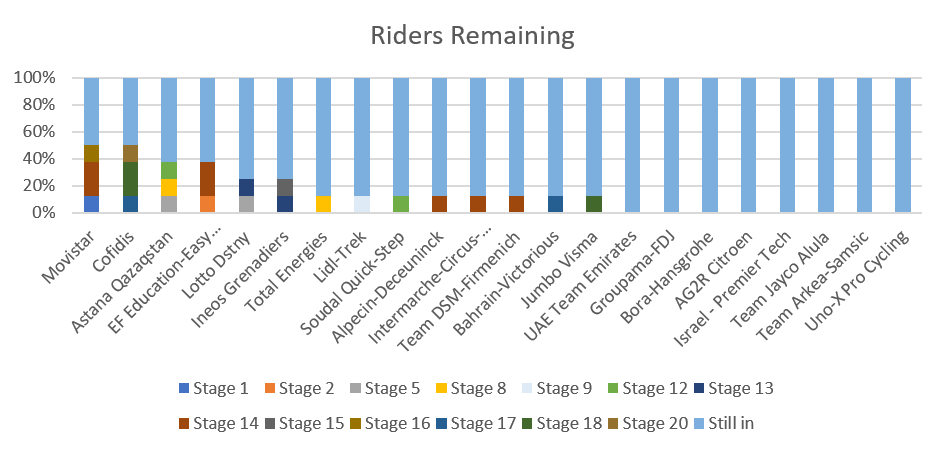 Cofidis and Movistar both lost half of their riders, while UAE, FDJ, Bora-Hansgrohe, AG2R, Israel Premier Tech, Jayco, Arkea and Uno-X didn't lose a single rider.
Cofidis and Movistar both lost half of their riders, while UAE, FDJ, Bora-Hansgrohe, AG2R, Israel Premier Tech, Jayco, Arkea and Uno-X didn't lose a single rider. 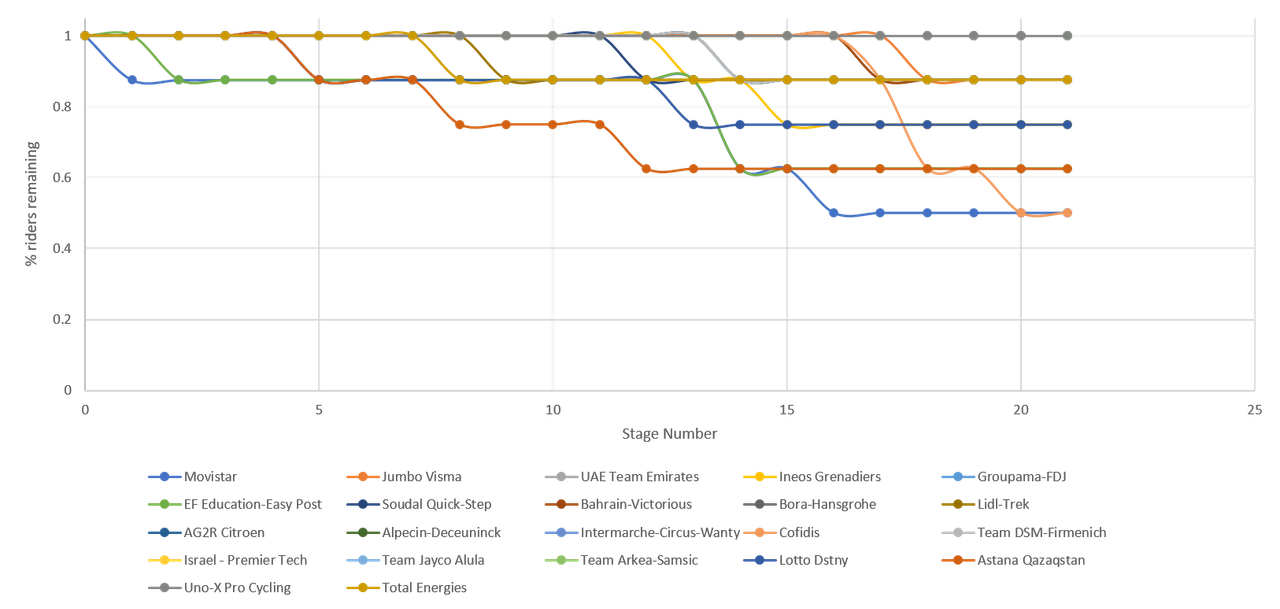 EF's green unfortunately covers up the same thing happening to Movistar.
EF's green unfortunately covers up the same thing happening to Movistar. 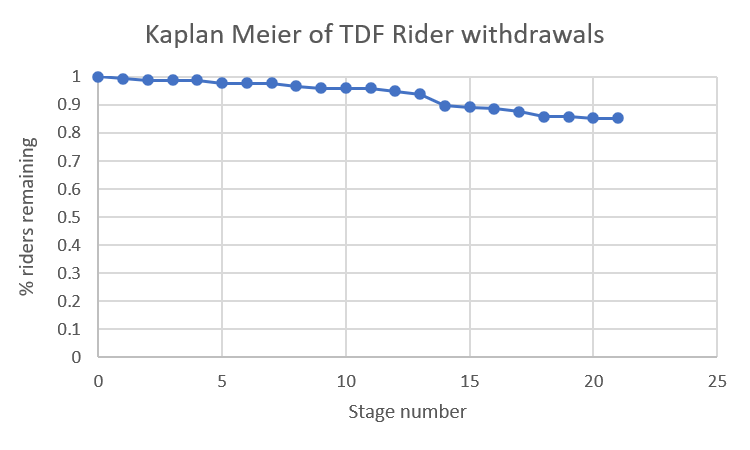 Comparing the withdrawals to the 2020, 2021 and 2022 Tours de France, it looks like this:
Comparing the withdrawals to the 2020, 2021 and 2022 Tours de France, it looks like this:
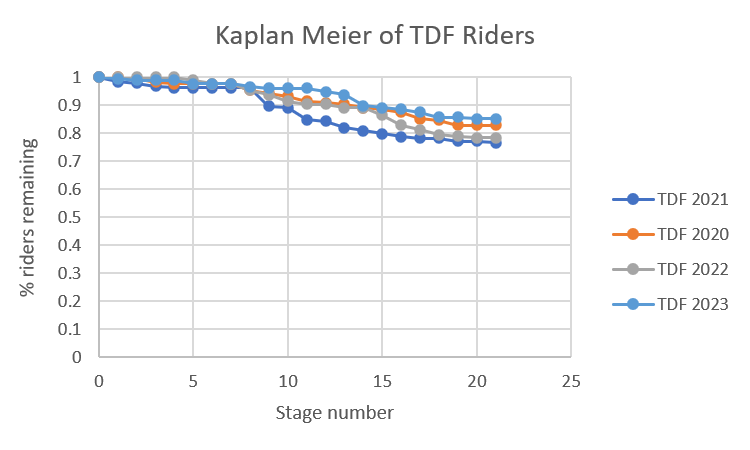 2021 and 2022 have very similar shapes, while 2023 looks more like 2020.
2021 and 2022 have very similar shapes, while 2023 looks more like 2020.  That figure made me feel good because my home-brew version looks very similar to it, so I don't think I'm going too wrong with my methodology.
That figure made me feel good because my home-brew version looks very similar to it, so I don't think I'm going too wrong with my methodology. 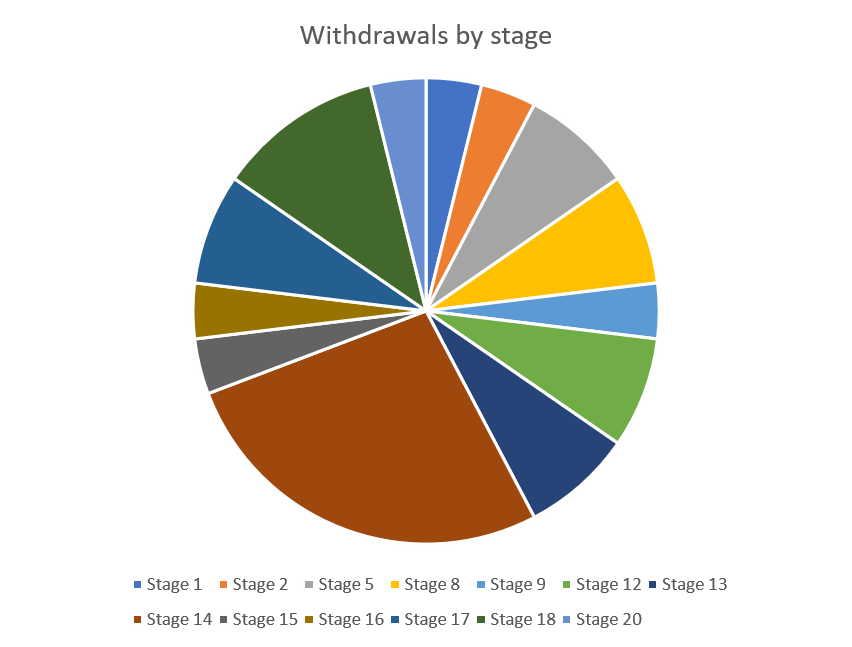
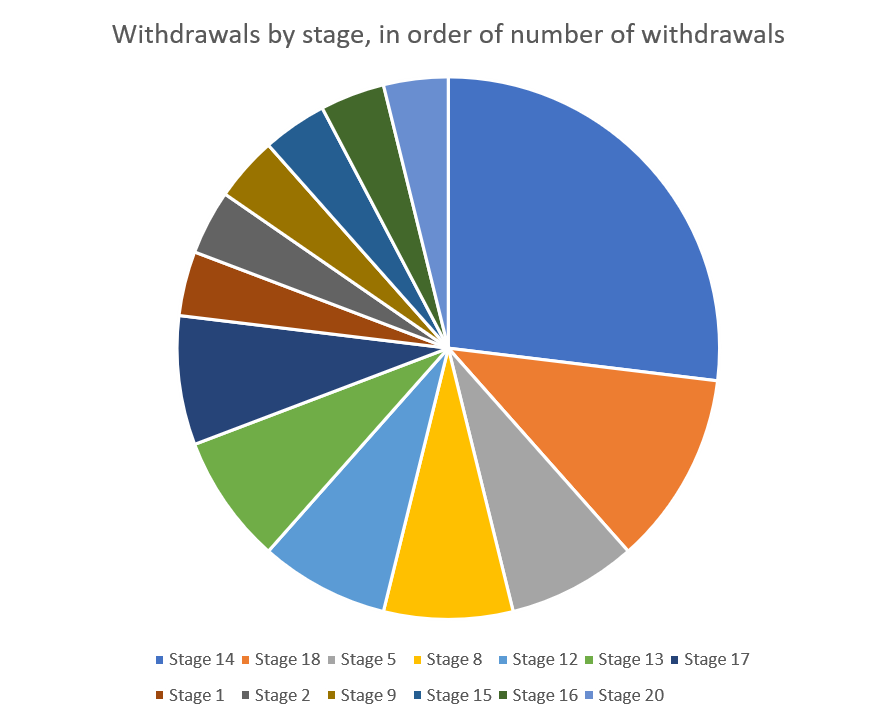 Stage 14 was the stage with the most withdrawals by a long way. To refresh your memory, it was a combination of a slippy road, a turn and ill-fortune that took down a swath of riders (https://www.eurosport.co.uk/cycling/tour-de-france/2023/tour-de-france-neutralised-after-extraordinarily-nasty-moment-on-stage-14-involving-almost-all-teams_vid1951457/video.shtml)
Stage 14 was the stage with the most withdrawals by a long way. To refresh your memory, it was a combination of a slippy road, a turn and ill-fortune that took down a swath of riders (https://www.eurosport.co.uk/cycling/tour-de-france/2023/tour-de-france-neutralised-after-extraordinarily-nasty-moment-on-stage-14-involving-almost-all-teams_vid1951457/video.shtml)  This is because of mid-stage abandonments, because relatively few of the DNS withdrawals were in week 2.
This is because of mid-stage abandonments, because relatively few of the DNS withdrawals were in week 2.
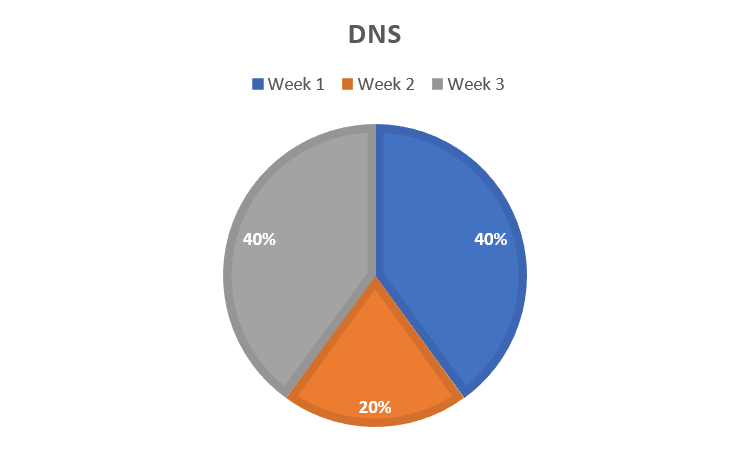
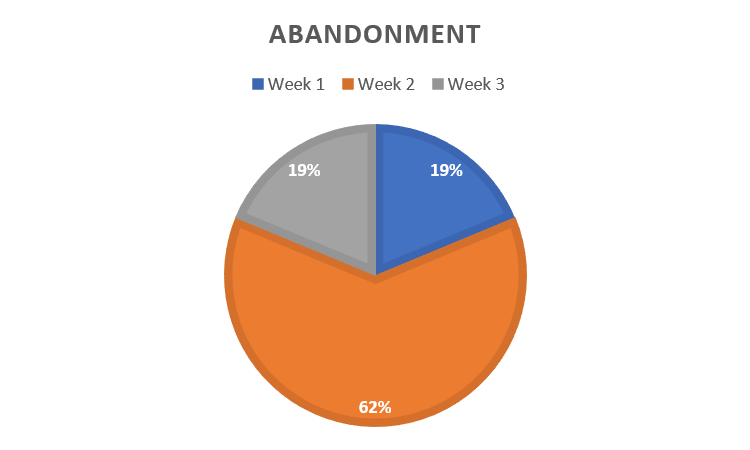 Things I will look out for next year?
Whether this "no outside the time limit withdrawals" pattern happens again next year, and whether the curve shape is the same again, next year being another Olympic year.
Things I will look out for next year?
Whether this "no outside the time limit withdrawals" pattern happens again next year, and whether the curve shape is the same again, next year being another Olympic year. Wednesday 1 November 2023
The road to explicableness - A closer look at England after their seventh World Cup game
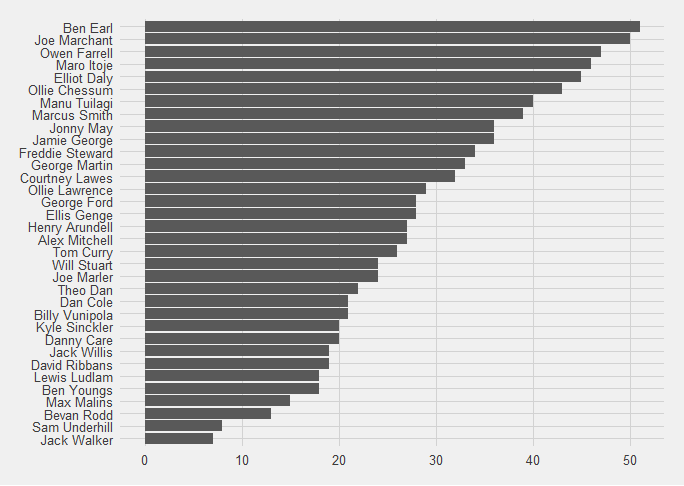 Jack Walker and Sam Underhill were present for the least (7 and 8 respectively), which makes sense because they only took part in 1 game each. Bevan Rodd was present for 13 over 2 games.
Jack Walker and Sam Underhill were present for the least (7 and 8 respectively), which makes sense because they only took part in 1 game each. Bevan Rodd was present for 13 over 2 games. 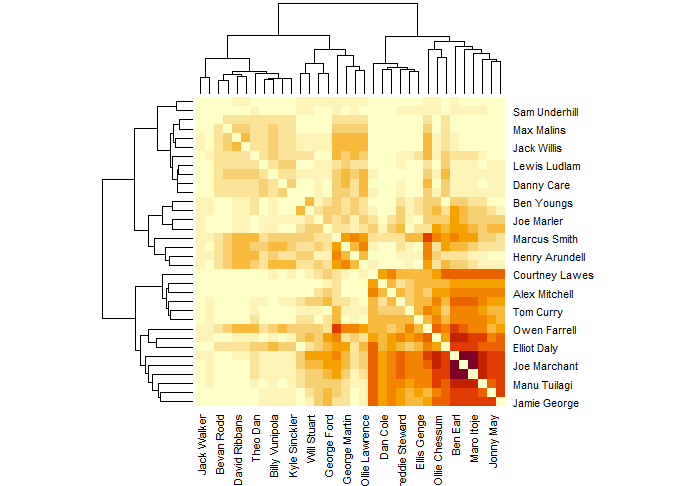 (I'm being slightly mean to Steve Borthwick there, it's clear that he would have played Theo Dan only he's an excellent future replacement for Jamie George when he retires, but Jamie George is still there)
(I'm being slightly mean to Steve Borthwick there, it's clear that he would have played Theo Dan only he's an excellent future replacement for Jamie George when he retires, but Jamie George is still there) 
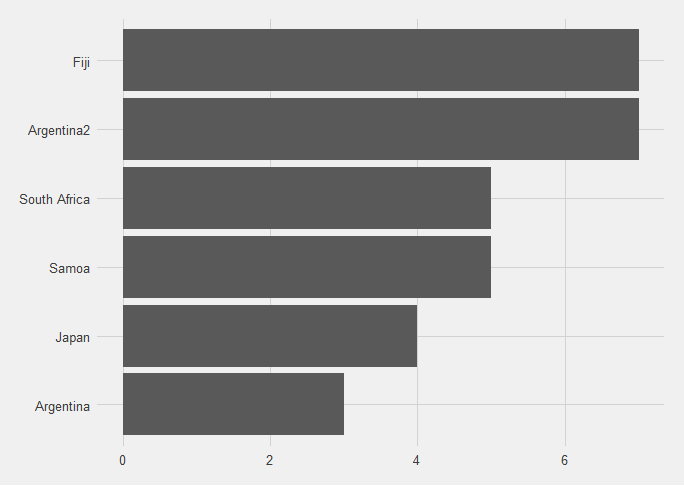 The pattern have of England conceding in minute 20-30 and 60-70 remained, which can be seen in two more charts, one with when England conceded, and then that chart coloured by which team scored against England.
The pattern have of England conceding in minute 20-30 and 60-70 remained, which can be seen in two more charts, one with when England conceded, and then that chart coloured by which team scored against England. 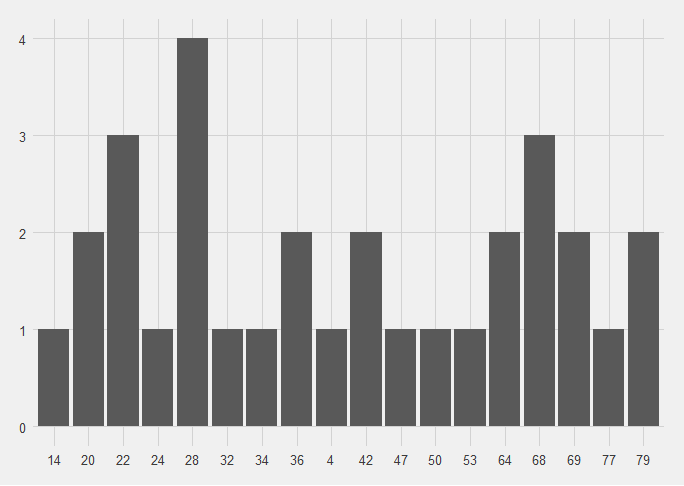
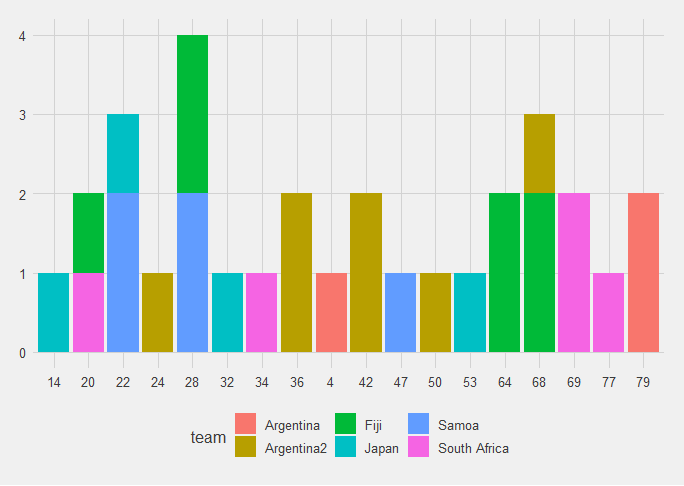 Maro Itoje, Ben Earl and Joe Marchant were on the pitch for the most point-concession moments, but they were on the pitch a lot.
Maro Itoje, Ben Earl and Joe Marchant were on the pitch for the most point-concession moments, but they were on the pitch a lot.
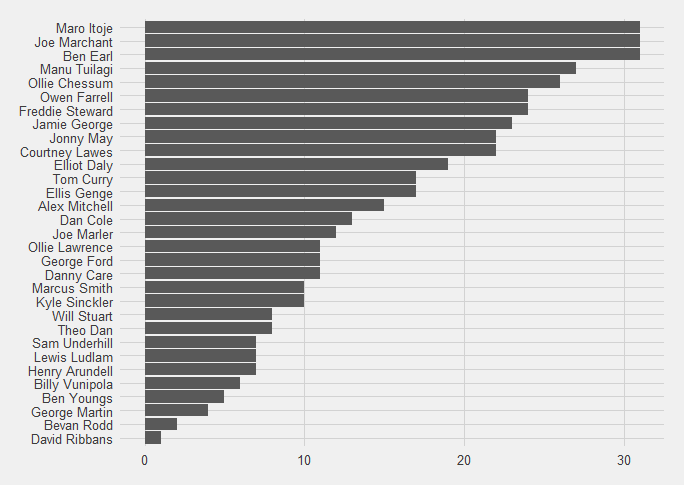 They were on for 31/31 point-conceding moments. David Ribbans, Bevan Rodd and George Martin (no, not that one) were present for the least, present for 1,2 and 4 point-conceding moments respectively.
They were on for 31/31 point-conceding moments. David Ribbans, Bevan Rodd and George Martin (no, not that one) were present for the least, present for 1,2 and 4 point-conceding moments respectively. 